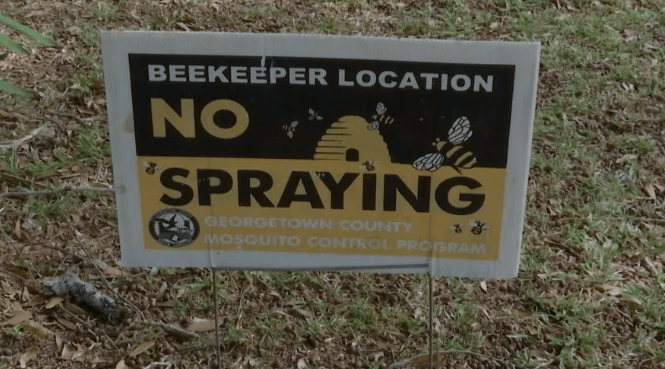The decline in hive numbers among honeybee colonies is endangering both the economy and the nation’s food supply, despite their role in producing the beautiful spring blooms we see outdoors.
The Department of Agriculture reports that South Carolina has seen a decline of nearly 23% in Honeybee colonies over the past two years.
In Murrells Inlet, Peggy and John, owners of Beach Bees, are dedicated to rescuing these important pollinators.
Peggy Renoe stated that when they initially moved to the area 18 years ago, there were honeybees all around, but gradually over time, they disappeared.
Starting with only one hive, the Renoe family now oversees a total of seven hives and the number continues to grow. Each hive is filled with more than 50,000 bees.
These beehives are more than just containers of flying insects; they are small ecosystems teeming with life and significance, offering crucial pollination services that are often ignored but essential for crop growth.
A USDA report states that honeybees are responsible for pollinating 75 percent of the fruits, nuts, and vegetables in the country.
Peggy Renoe stated that you need to have them for a variety of purposes.
An article by an Associate Professor at Clemson University’s Department of Entomology, Soils, and Plant Sciences states that South Carolina’s agricultural economy benefits from approximately $25 million annually from the commercial cultivation of apples, cantaloupes, cucumbers, and watermelons.
When it comes to producing honey, John Renoe explained that one hive box can hold as much as 50 pounds of honey.
John Renoe explained that he does not remove all the honey from the bees because they have worked hard to produce it and need it for themselves.
Honeybee colonies decline
However, honeybees are encountering increasing obstacles such as the loss of their natural habitats and exposure to pesticides, which are causing a decline in hive populations.
According to Peggy Renoe, pesticides are likely the biggest concern, but the county does a good job of informing residents about when they will be used.
According to a USDA report, honeybee colonies are decreasing by nearly 50 percent annually. However, the Renoe family stated that they only lose approximately 10 percent of their colonies each winter.
Peggy Renoe expressed happiness in seeing an increase in the number of bees since they began.


